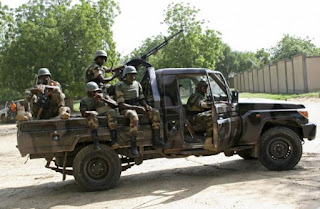Signs of possible success in US-Niger collaboration against Boko Haram
 |
The Diffa meeting was a modest success not just for its mutually suspicious tribes but for a small team of fewer than 20 U.S. Special Operations Forces conducting an experiment that is part of President Barack Obama's new counter-terrorism strategy.
The soldiers, who encouraged the meeting and helped provide a ring of security, do not go into combat, or even wear uniforms. They are quietly trying to help Niger build a wall against Boko Haram's incursions and its recruitment of Diffa's youth.
A Reuters reporter was the first to visit the detachment, which is among about 1,000 U.S. Special Operations Forces deployed across Africa.
In Chad, Nigeria, Niger and elsewhere, they are executing Obama's relatively low-risk strategy of countering Islamic extremists by finding local partners willing to fight rather than deploying combat troops by the thousands....
In Niger, there are signs of success against Boko Haram, although progress will likely be slow in a years-long effort, ...
In April, at Niger's request, the American soldiers reinforced their small ranks on a drab, dusty compound with few amenities. Boko Haram was mounting a regional rampage and in February had launched significant attacks inside Niger for the first time.
Working alongside them is an unusual U.S. non-profit group, Spirit of America, that says it also aims to leave a light footprint. Under written understandings with the Pentagon, it buttresses U.S. military missions by providing local populations with small-scale assistance that would take Washington's bureaucracy months or years to procure.
In Niger, the group has provided first-aid kits, Camelbak hydration systems and medical detectors for Niger's military. It covered the $4,000 cost of the anti-Boko Haram summit.
"It's providing them with enough to get through this critical phase," said Isaac Eagan, Spirit of America's field operations director. "It's not fixing everything."
Boko Haram has long used Niger for refuge and resupply, officials said. By the time the U.S. team sergeant and his men arrived, it had been luring young men from Diffa's villages since the late 2000s, offering money and adventure, he said.
"We missed the recruiting portion of it," he said.
Anafi Ousmane, a member of Diffa's mayor's council, told Reuters there had been three consecutive bad harvests of peppers, a primary crop, leaving young farmers deep in debt.
"Now Boko Haram's seeing that vulnerability," he said through a translator. "I will give you money. I will give you another motor bike, I will give you a woman. Join me."
One group of U.S. soldiers was training Niger military's 3rd Antiterrorist Company. Another began to grapple with the civilian side of the problem, accompanying the nascent civil-military affairs unit of Niger's military on visits to villages up and down the river.
They encouraged villagers to report Boko Haram activity to military authorities and young people to establish watch groups. Spirit of America provided mobile phone credits to help.
Boko Haram has killed suspected informants and fear of the group persists. In June, the militants attacked two villages in Diffa, killing at least 30 civilians. Some died inside their mostly straw-thatched houses, which were set alight.
Sergeant Fougou Saley, chief of civil-military affairs for the Diffa region, said Boko Haram's violent tactics have alienated much of the populace. But he said it still draws support from some of the Kanuri people, whose lands straddle northeastern Nigeria and southeastern Niger.
"In some places, some still have their heart toward Boko Haram," said Saley, himself a Kanuri.
But African, U.S. and European officials say the group's attacks in Niger have dropped significantly in the face of a regional counter-offensive this year by Nigeria, Niger, Chad and Cameroon. ...


Comments
Post a Comment